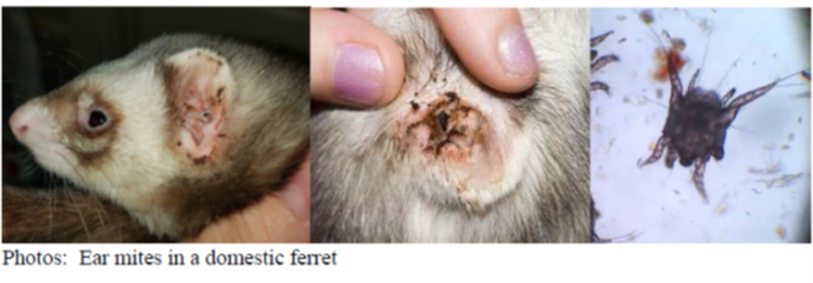Does Your Ferret Have Ear Mites? Ferrets, like other mammals, normally have ear wax (cerumen). “Normal” ear wax in ferrets is light brown, orange, or reddish in color. Itchy dark-reddish to brown ear wax with black spots in or around the ears may indicate your ferret has “ear mites.” Ear mites are tiny spider-like external parasites of the species Otodectes cynotis. These mites can infest the ears of warm-blood mammals, including dogs, cats, ferrets, rodents and rabbits. Generally they do not infest humans. Signs Aside from the appearance in the ear, ferrets may respond to the itchiness with frequent scratching and rubbing of the head, head shaking, or even walking with the head tilted to one side. Diagnosis A trip to the veterinarian will identify if your ferret has ear mites, or if something else is causing these signs. A sample of your ferret’s earwax is examined under a microscope. It can show the presence of these tiny mites or their eggs. Treatment Ferrets can be treated with drugs in the form of ear drops, such Ivermectin, or the topical application of Selamectin. Selamectin, (also known as Revolution® - Zoetis, Selarid – Norbrook, Senergy - Virbac) is an oily drug that is applied and rubbed into the skin on the ferret’s back between the shoulder blades. It will spread over to the ferret’s ears. These medications should ONLY be used under the guidance of a veterinarian familiar with ferrets. Prevention Treatment alone is not enough. If your ferret has ear mites, it will be important to clean the ferret’s bedding, toys and cage. If the infected ferret has cage mates, or if there are other animals in the household, these, too, should be checked for ear mites and treated as recommended by the veterinarian. Further reading: Miller D, et al. Efficacy and safety of selamectin in the treatment of Otodectes cynotis infestation in domestic ferrets.” The Veterinary Record. vo1 l59, 2006. Patterson C. Selamectin use in companion animals. Today’s Veterinary Practice. Aug 4, 2021. [article does not mention ferrets] https://todaysveterinarypractice.com/pharmacology/selamectin-use-in-companion-animals/ Accessed July 2023] Rich G, Axelson R. Ferrets - Ear Mites. VCA Animal Hospitals. https://vcahospitals.com/know-your-pet/ferrets-ear-mites [Accessed July 2023] |
Details
Archives
April 2024
Categories
All
|
|
Terms and Conditions
|
allFerrets® 2014-2024. ALL RIGHTS RESERVED.
Proudly designed by widgIT |

 RSS Feed
RSS Feed
